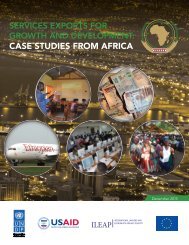BUDGET
budget
budget
Create successful ePaper yourself
Turn your PDF publications into a flip-book with our unique Google optimized e-Paper software.
60 MEETING OUR GREATEST CHALLENGES: OPPORTUNITY FOR ALL<br />
of eligibility determinations for Marketplace<br />
financial assistance.<br />
Improving the Excise Tax on High-Cost<br />
Employer Coverage. The ACA included an excise<br />
tax on the highest-cost employer-sponsored<br />
health insurance plans to give employers an incentive<br />
to make those plans more efficient. The<br />
Budget proposes to modify the threshold above<br />
which the tax applies to be equal to the greater<br />
of the current law threshold or the average<br />
premium for a Marketplace gold plan in each<br />
State. This reform would protect employers from<br />
paying the tax only because they are in high-cost<br />
areas and ensure that the tax remains targeted<br />
at the highest-cost plans in the long term. The<br />
Budget would also make it easier for employers<br />
offering flexible spending arrangements to calculate<br />
the tax. Finally, the proposal would require<br />
the Government Accountability Office to conduct<br />
a study of the potential effects of the tax on firms<br />
with unusually sick employees, in consultation<br />
with the Department of the Treasury and other<br />
experts.<br />
Strengthening Medicare,<br />
Medicaid and CHIP<br />
Together, Medicare, Medicaid, and CHIP<br />
provide affordable health coverage to support<br />
longer, healthier lives and economic security for<br />
the Nation’s seniors, people with disabilities,<br />
and low-income working Americans and families.<br />
Today, Medicare provides about 55 million<br />
Americans with dependable health insurance.<br />
State Medicaid and CHIP programs provide<br />
health and long-term care coverage to more than<br />
70 million low-income Americans. The Budget<br />
strengthens the Medicare and Medicaid programs<br />
through reforms that expand and extend<br />
health coverage in Medicaid and CHIP, encourage<br />
high-quality and efficient care, and continue<br />
the progress of reducing cost growth.<br />
Expanding Health Coverage by<br />
Improving Access to Medicaid and CHIP<br />
Coverage and Services. The Budget gives<br />
States the option to streamline eligibility determinations<br />
for children in Medicaid and CHIP<br />
and to maintain Medicaid coverage for adults by<br />
providing one-year of continuous eligibility. The<br />
Budget also extends full Medicaid coverage to<br />
pregnant and post-partum Medicaid beneficiaries,<br />
expands access to preventive benefits and<br />
tobacco cessation for adults in Medicaid, streamlines<br />
appeals processes, and ensures children in<br />
inpatient psychiatric treatment facilities have<br />
access to comprehensive benefits. The Budget<br />
also fully covers the costs of the Urban Indian<br />
Health Program (UIHP) clinics for Medicaid<br />
services provided to eligible American Indians<br />
and Alaska Natives, supporting the expansion of<br />
UIHP service offerings and improving beneficiary<br />
care.<br />
Preserving Coverage through CHIP.<br />
CHIP currently serves more than eight million<br />
children of working parents who are not eligible<br />
for Medicaid. While the Medicare Access and<br />
CHIP Reauthorization Act extended CHIP funding<br />
through 2017, the Budget proposes to extend<br />
funding for CHIP through 2019, ensuring continued,<br />
comprehensive, affordable coverage for<br />
these children.<br />
Strengthening Medicaid in Puerto Rico<br />
and other U.S. Territories. The Medicaid programs<br />
in Puerto Rico and the other U.S. territories<br />
of American Samoa, Guam, Northern Mariana<br />
Islands, and the U.S. Virgin Islands are fundamentally<br />
different from the Medicaid program in<br />
the States, leading to a lower standard of care<br />
than may be otherwise experienced on the mainland.<br />
Medicaid funding in Puerto Rico and the<br />
other territories is capped; beneficiaries are offered<br />
fewer benefits; and the Federal Government<br />
contributes less on a per-capita basis than it does<br />
to the rest of the Nation. The ACA increased the<br />
Federal match rate and provided $7.3 billion<br />
above the territory funding caps between July<br />
1, 2011 and the end of 2019. To avoid a loss in<br />
coverage when the supplemental funds provided<br />
in the ACA run out and to better align Puerto<br />
Rico and other territory Medicaid programs with<br />
the mainland, the Budget would remove the cap<br />
on Medicaid funding in Puerto Rico and the other<br />
territories. It also would gradually increase<br />
the Federal support territories receive through




